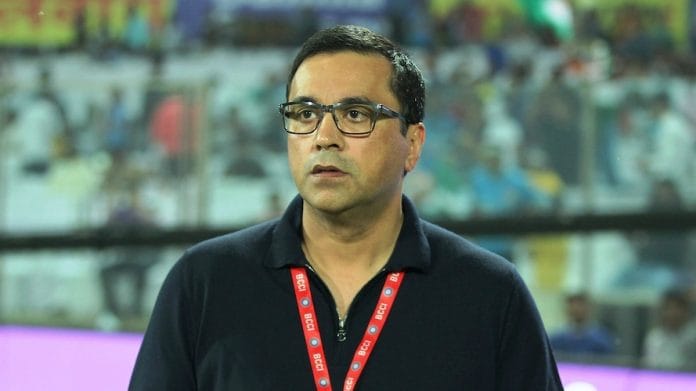The allegations against BCCI CEO Rahul Johri come days after Vinod Rai was accused of covering up sexual harassment in the cricket body.
New Delhi: The wave of sexual harassment allegations that began India’s #Metoo movement crashed on the shores of Indian cricket, specifically the Board of Control for Cricket in India (BCCI), Saturday.
Rahul Johri, the first chief executive of the BCCI, has been accused of harassment in an explosive and explicit set of tweets.
The victim, who remains anonymous, shared her story with poet Harnidh Kaur, who put it out on Twitter:
https://twitter.com/PedestrianPoet/status/1050804696779300864
Johri has been asked by the Committee of Administrators, headed by Vinod Rai, to submit an explanation on the allegations within a week.
“There are certain media reports today, including in the social media, pertaining to Mr Rahul Johri, CEO BCCI,” the committee said in a statement Saturday.
“The reports disclose allegations of sexual harassment made against Mr Johri by an unnamed person through a Twitter handle. The allegations also relates (sic) to his previous employment with a large media house,” it added.
“Though the said allegations do not pertain to his employment with the BCCI, the Committee of Administrators of the BCCI has deemed it appropriate to seek an explanation from Mr Johri in relation to the allegations. He has been asked to submit his explanation within a week,” the statement said, “Future course of action will be considered on receipt of his explanation.”
Also read: #MeToo: The Times of India editor KR Sreenivas resigns after sexual harassment allegations
The question before Vinod Rai
It was not long ago that Aditya Verma, secretary of the Cricket Association of Bihar, wrote multiple letters to Rai, detailing sexual harassment issues within the BCCI.
In his letter, Verma had said: “I would like to remind you that you otherwise run the risk of being remembered as the person under whose control such actions were ignored or swept under the carpet.”
“…Let me remind you that omitting to act responsibly i.e. willful negligence acts as encouragement to the predators and perpetrators of such acts and it would be disgraceful if a person appointed by the Hon’ble Supreme Court would choose to,” he added.
The fact that this comes on the back of existing allegations of sexual harassment against a BCCI employee who may or may not be the same person puts Rai in a spot. Verma’s third missive to Rai, which got no response, was first reported by ThePrint.
While it is unclear who the BCCI official in question is, and Rai did not announce what, if any, action had been taken against the person, it is worth remembering that he suspended the central contract of cricketer Mohammad Shami as soon as his wife accused him of harassment this March.
Hasin Jahan, Shami’s wife, had taken to social media to lash out at the cricketer.
Rai then told ESPNCricinfo, “We are in a bit of Catch-22 situation. Ordinarily, you would distinguish and say that [the allegation] is a personal issue and the contract is a professional issue. But someone could easily point out and say this allegation is an unsavoury one and you are still rewarding him.”
Despite the situation being delicate, Shami’s central contract was withheld and it was only after an inquiry that it was re-instated.
Also read: Days before MeToo, Vinod Rai was accused of covering up sexual harassment by BCCI colleague
The question before Rai now is whether he will hold the BCCI chief executive to the same standards that he applied to an India cricketer.
Neither Rai nor Johri responded to repeated calls for comment.







There is not just pain but a commonwealth of honesty behind Me Too. I read Ms Ira Trivedi’s column in Outlook, in which she talks about inappropriate behaviour by Suhel Seth and Chetan Bhagat. Of a less savage intensity, true, than some of the instances that are now in the public domain. She writes how, in light of her presence in publishing and media, she continued her professional association with both men. It is clear she does not wish to file a criminal complaint. Although morally diminished, both men will continue to be important in their fields, exacting a price for her having spoken out. I think she wanted to lend her voice to the growing legitimacy and force of the movement. This is not a passing fad. Nor is it mainly about the past. What women are now seeking, more than closure for themselves – or punishment in a few cases like Ms Tanushree Datta – is a fundamental reordering of how men behave with women – the converse situation is still rare, so referring to it at this stage sounds like whataboutery – in workplaces or their adjuncts. This is not an overly ambitious agenda. What should hurt and surprise is why this moment has taken so long in coming. The message for Shri Vinod Rai and others who exercise authority over the men who stand accused is to not impede or obstruct a fair process of fact finding and the legal or other consequences that may follow. This genie will not go back into the bottle.